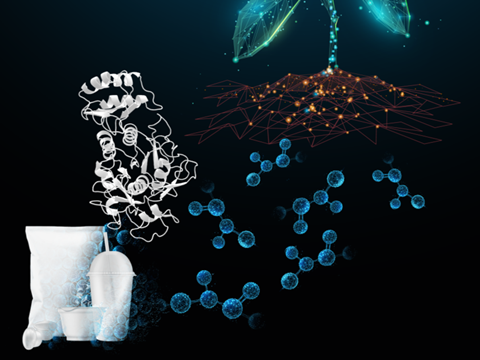
Carbios and the Toulouse Biotechnology Institute (TBI) are publishing an article presenting an enzyme-embedded PLA designed to quickly biodegrade in home-compost conditions – a development expected to result in plastic packaging that is compostable at ambient temperatures.
The article, titled ‘An engineered enzyme embedded into PLA to make self-biodegradable plastic’, will be published in 25th July 2024 issue of the scientific journal Nature. It has been co-authored by biotechnology researchers from Carbios and the Toulouse Biotechnology Institute, alongside professors from the Université de Mons and the Kasetsart University of Bangkok.
It lays out the optimization process through which an engineered enzyme can withstand a temperature of 170°C – the heat of molten PLA during the plastic production process. Embedding enzymes into PLA is expected to ‘fully and rapidly’ break it down in home compost or methanization conditions, and do so much faster than the 26 weeks required to certify a material as home-compostable.
The enzyme-embedded material, known as Carbios Active, is believed to produce more biomethane and provide another form of waste recovery. Since the enzyme is only activated under composting or methanization conditions, the material is also said to remain intact when stored – making it suitable for flexible packaging like sauce packets and wrappers; short-life items like food containers, yoghurt pots, and coffee capsules; and other commercial applications.
These PLA products are set to be 100% compostable at ambient temperatures, including domestic composting conditions, without leaving microplastics or toxic substances behind.
Carbios Active is not thought to require modifications to existing production lines. It can reportedly be integrated straight into plastic material transformation processes.
A production line is already in operation at Carbios’ headquarters in Clermond-Ferrand, France. It is reportedly capable of production 2,500 tons of Carbios Active per year, required for the equivalent of 50,000 tons of enzyme-embedded PLA annually.
“A publication in Nature is an especially proud moment for all the contributing teams, notably recognition from peers in the scientific community,” said Alain Marty, chief scientific officer at Carbios. “Developing an efficient enzyme that can withstand the 170°C needed to introduce it into PLA is an outstanding scientific feat!
“Our previous article published in Nature in 2020 was pivotal in bringing our PET biorecycling technology to the world stage. We are very excited by the enhanced visibility of Carbios’ unique biodegradation technology brought by this publication, as it offers a practical and scalable approach to various industrial PLA-based packaging applications.”
“Carbios Active is the real-life application of Carbios’ expertise in enzyme optimization and polymer science,” Carbios CEO Emmanuel Ladent continues. “As Carbios expands its portfolio of enzymatic solutions beyond PET, enzyme-embedded PLA represents a major leap forward, addressing a critical gap in the market for compostable plastic.
“The recognition from the scientific community through this new publication in Nature comes in addition to recent certifications, such as the Food Contact Notification delivered by the FDA in North America, to attest Carbios Active’s performance and support its commercial deployment. Thanks to our long-term and exclusive partnership with Novonesis, we are transforming this scientific breakthrough into reality.”
Isabelle André, research director at Centre national de la recherche scientifique (CNRS), added: “I am immensely proud that the efforts and dedication of the researchers at TBI and our long-term partners at CARBIOS have been recognized by the journal Nature. This pioneering work on enzyme-embedded PLA to make self-biodegradable plastic is testament to our commitment to developing sustainable solutions with enzyme engineering at the core.”
Last year, an article in scientific journal ACS Catalysis argued that Carbios’ PET-degrading enzyme was the best-performing under industrial conditions compared to the PHL7 variant of PES-H1 from the University of Greifswald and two variants of the IsPETase enzyme produced by Ideonella sakaiensis from the University of Manchester and the University of Texas at Austin. The enzyme is expected to be used for depolymerization in the ‘world’s first’ bio-recycling plant due for commissioning in 2025.
A groundbreaking ceremony was held for the plant back in April, with various supply agreements having been signed to source waste. This includes an agreement with Hündgen Entsorgungs to source, prepare, and supply 15kt of post-consumer PET flakes every year from late 2026.
Carbios has also joined forces with L’Occitane en Provence and Pinard Beauty Pack to transition shower oil from the L’Occitane Amande range into a transparent PET bottle made entirely from enzymatic recycling. This is expected to contribute to the retailer’s target to produce all its retail bottles from 100% post-consumer recycled PET by 2027.
If you liked this story, you might also enjoy:
How are the top brands progressing on packaging sustainability?
Sustainable Innovation Report 2024: Current trends and future priorities
Reuse vs. single use – which is better for the environment?
The ultimate guide to global plastic sustainability regulation













No comments yet